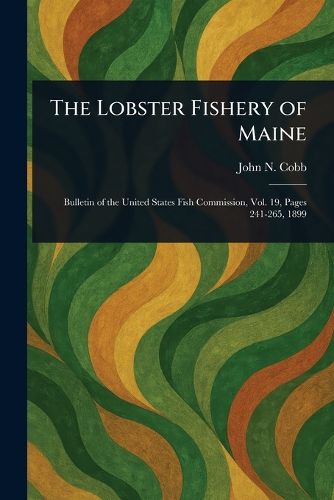Readings Newsletter
Become a Readings Member to make your shopping experience even easier.
Sign in or sign up for free!
You’re not far away from qualifying for FREE standard shipping within Australia
You’ve qualified for FREE standard shipping within Australia
The cart is loading…






This title is printed to order. This book may have been self-published. If so, we cannot guarantee the quality of the content. In the main most books will have gone through the editing process however some may not. We therefore suggest that you be aware of this before ordering this book. If in doubt check either the author or publisher’s details as we are unable to accept any returns unless they are faulty. Please contact us if you have any questions.
"The Lobster Fishery of Maine," by John N. Cobb, offers a fascinating glimpse into the late 19th-century world of Maine's vital lobster industry. Originally published as part of the Bulletin of the United States Fish Commission in 1899, this meticulous study provides detailed insights into the practices, challenges, and significance of harvesting these valuable crustaceans.
Explore the historical context of lobster fishing in Maine, examining the techniques and technologies employed during this era. This volume delves into the marine biology of lobsters and the economic importance of the lobster fishery to the region. A valuable resource for anyone interested in marine life, natural resources, or the history of animal husbandry, "The Lobster Fishery of Maine" provides a unique window into a bygone era of American industry and coastal life. This historical text has been carefully prepared for print republication, preserving its original integrity and scholarly value.
This work has been selected by scholars as being culturally important, and is part of the knowledge base of civilization as we know it.
This work is in the public domain in the United States of America, and possibly other nations. Within the United States, you may freely copy and distribute this work, as no entity (individual or corporate) has a copyright on the body of the work.
Scholars believe, and we concur, that this work is important enough to be preserved, reproduced, and made generally available to the public. We appreciate your support of the preservation process, and thank you for being an important part of keeping this knowledge alive and relevant.
$9.00 standard shipping within Australia
FREE standard shipping within Australia for orders over $100.00
Express & International shipping calculated at checkout
This title is printed to order. This book may have been self-published. If so, we cannot guarantee the quality of the content. In the main most books will have gone through the editing process however some may not. We therefore suggest that you be aware of this before ordering this book. If in doubt check either the author or publisher’s details as we are unable to accept any returns unless they are faulty. Please contact us if you have any questions.
"The Lobster Fishery of Maine," by John N. Cobb, offers a fascinating glimpse into the late 19th-century world of Maine's vital lobster industry. Originally published as part of the Bulletin of the United States Fish Commission in 1899, this meticulous study provides detailed insights into the practices, challenges, and significance of harvesting these valuable crustaceans.
Explore the historical context of lobster fishing in Maine, examining the techniques and technologies employed during this era. This volume delves into the marine biology of lobsters and the economic importance of the lobster fishery to the region. A valuable resource for anyone interested in marine life, natural resources, or the history of animal husbandry, "The Lobster Fishery of Maine" provides a unique window into a bygone era of American industry and coastal life. This historical text has been carefully prepared for print republication, preserving its original integrity and scholarly value.
This work has been selected by scholars as being culturally important, and is part of the knowledge base of civilization as we know it.
This work is in the public domain in the United States of America, and possibly other nations. Within the United States, you may freely copy and distribute this work, as no entity (individual or corporate) has a copyright on the body of the work.
Scholars believe, and we concur, that this work is important enough to be preserved, reproduced, and made generally available to the public. We appreciate your support of the preservation process, and thank you for being an important part of keeping this knowledge alive and relevant.